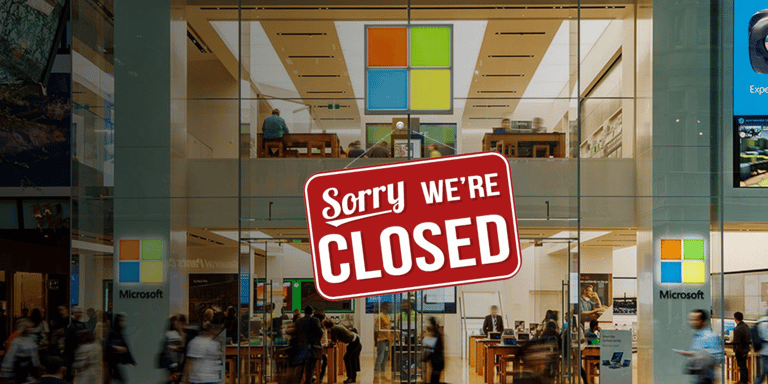Subscribe now and get the latest podcast releases delivered straight to your inbox.
Microsoft takes a 'new approach to retail' by closing all its physical stores

By Eric Choma
Jul 1, 2020

As the worst of the COVID-19 pandemic seems to have passed for much of the world, the long shadow of the illness and the quarantine continue to play out for businesses large and small.
From mom and pop local outfits to multinational corporations, COVID reverberations and after-shocks will continue for the foreseeable future — but the exact nature of these can be difficult to predict.
This week, Microsoft — the eighth-largest public company in the U.S. — abruptly pivoted its retail strategy.
Microsoft announced its major strategy shift on Friday, deciding to close all of its brick-and-mortar retail stores. According to CNN, this will cost the tech giant about $450 million in taxes, but will likely save it money in the long run.
Microsoft also says it will “reimagine spaces that serve all customers,” which includes turning brick-and-mortar stores in London, New York City, Sydney and Redmond, Washington into “experience centers.”
Putting this pivot in context
According to Microsoft’s Corporate VP David Porter, the company’s digital presence weighed heavily into the decision:
“Our sales have grown online as our product portfolio has evolved to largely digital offerings, and our talented team has proven success serving customers beyond any physical location.”
According to The Verge, Microsoft claims to reach more than 1.2 billion people every month in 190 markets through its online marketplaces for Xbox and Windows.
Now, it will put more emphasis there.
Microsoft’s Retail History
In 2009, after hiring Porter, a former Walmart exec, the Microsoft opened its first retail store in Scottsdale, Arizona alongside the launch of its Windows 7 operating system.
It eventually opened a store in Silicon Valley in 2011, strongly influenced by Apple Inc.’s design aesthetic and approach, this time in conjunction with the launch of the Windows Phone.
Microsoft has operated many more physical retail stores over the past decade. At its peak, the company had 116 locations around the world, including 106 in the United States.
Despite plans to shutter its stores, Microsoft says that there will be no layoffs as a result of the decision.
Rooted in Self-Awareness
Microsoft’s decision is bold but admirable. While it must have been a difficult choice, sometimes the only way to get through a business crisis is to take a step back and reassess your market.
The COVID crisis has forced many American businesses to reevaluate their expenses, especially in relation to physical locations.
If working from home is a possibility, is an expensive office location still a necessity? If you can sell just as well over the internet, do you need your brick and mortar storefront to still be your flagship?
Microsoft knows the value of its online audience, and by closing the doors to its stores, the company is showing its ability to identify areas of weakness and make the tough decisions for the future of their business.
Business leaders of every stripe should talk notes on Microsoft’s choice.
What has your company done in the past week, month, or quarter to make sure you’re still around when the dust settles? How are you preparing to thrive in the post-COVID economy?
Are you leveraging your digital audience as much as you should? Are there any drastic changes you could make that sound crazy, but make sense for the future of your business?
Take a page out of Microsoft’s book and just go for it. Sometimes a cost in the short term can yield great rewards down the road.


Order Your Copy of Marcus Sheridan's New Book — Endless Customers!